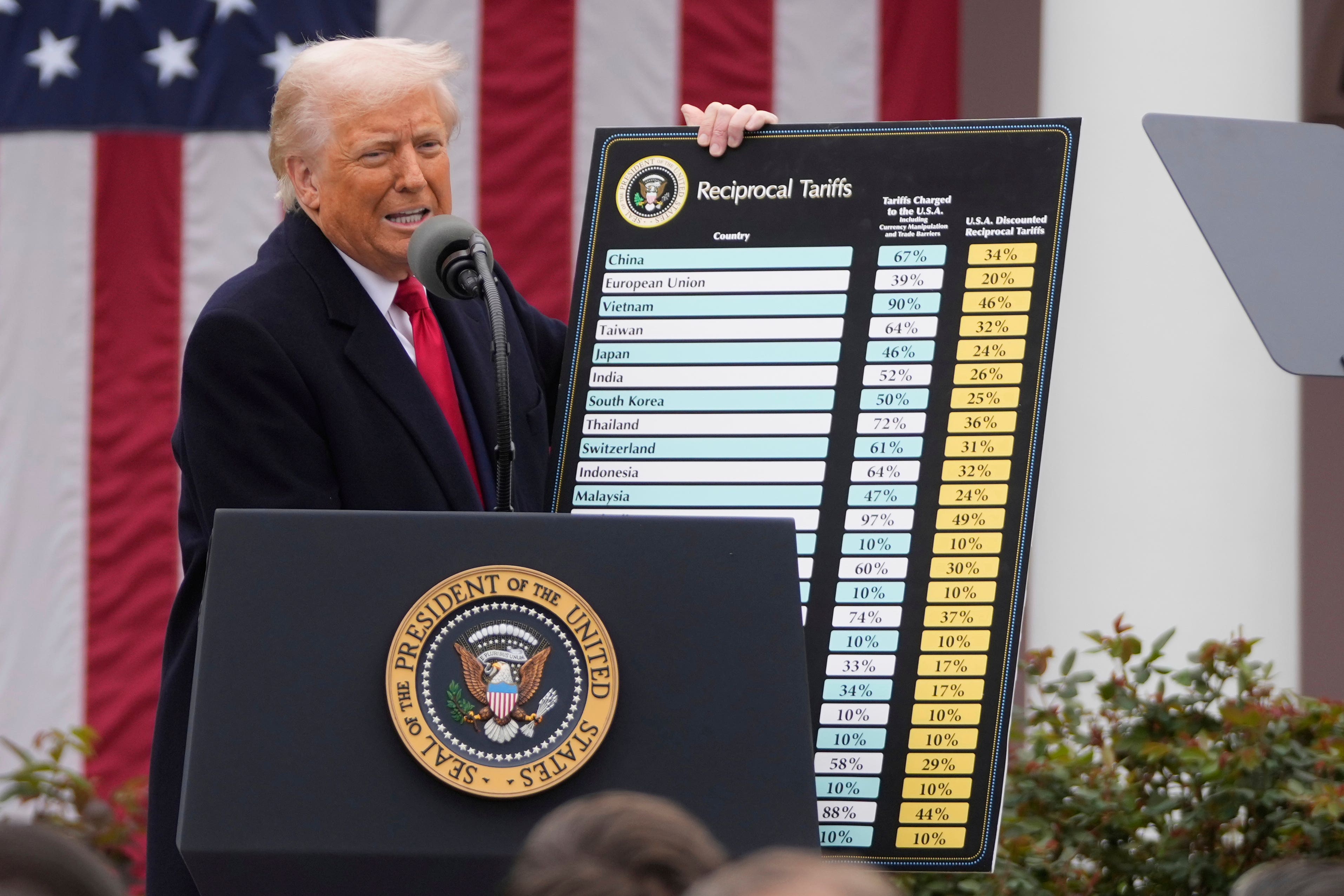Foreign Secretary David Lammy has said people across the country are “very concerned” about how the move by the United States to place 10 per cent import taxes on goods would hit their own finances.
Here is a look at how households may find their finances could be affected:
What about prices in shops?
Sarah Coles, head of personal finance at Hargreaves Lansdown, said: “The impact on prices isn’t nailed on at this stage.
“There are a number of forces that could keep a lid on inflation. Worries about growth around the world mean central banks may keep interest rates as low as possible in order to support whatever growth is around.”
Fluctuations in sterling against other currencies will have an impact on prices.
Ms Coles said: “We might also see some of the goods that were destined for the US being diverted elsewhere around the world – including the UK.
“If it means a glut, it could mean there are some decent bargains around. Plus, some companies will want to hold prices lower, in order to compete more effectively against US businesses, so we could benefit from that.

“However, there’s still the risk of inflation, because there’s the chance that companies increase their prices worldwide to pass the pain of tariffs onto consumers. It means we’ll need to wait to see how all this shakes down.”
How about jobs and the wider economy?
If demand for exports reduces, some firms may have tough decisions to make about jobs, if they cannot find alternative markets.
Firms relying on significant exports to the US could be particularly exposed.
Cars are the top product exported from the UK to the US. For UK carmakers, the US is the second largest export market behind the European Union.
Some UK retailers also have a significant proportion of their sales generated in the US, while some also import heavily from international markets.
Spirits and other alcoholic drinks are among the UK’s most significant export sectors, particularly in Scotland due to global demand for scotch whisky.
The outlook for the economy could also be gloomier. Economic growth could also be reduced as a result of the tariffs, experts have predicted.
Could there be an impact on the housing market?
Richard Donnell, executive director at Zoopla, said the housing market is an extension of the UK economy, which sits in the global economy.
He said: “The housing market has largely adjusted to higher borrowing costs and slower economic growth. The impact of (Mr) Trump’s tariffs is complex to asses but overall its likely to suppress UK economic growth and keep inflation at levels that limit how much base rates will be cut in the near term.
“Our outlook for the housing market was based on average mortgage rates remaining around 4.5% over 2025. We still expect sales to grow over 2025 but price growth may slow more than expected as the market adjusts to the new stamp duty rates and increased caution by buyers on what to pay for homes.”

How are investments and pension savings being affected?
US tariff plans have shaken financial markets and some households are seeing the impact of volatility on their investments and pension pots.
Global stock markets have been affected and the UK’s top stocks slid further in value on Friday morning.
Analysts at Barclays have said there was a “high risk that the US economy enters a recession this year”.
With much still uncertain, finance experts have warned of the risks of investors making “knee-jerk” decisions.
Helen Morrissey, head of retirement analysis at Hargreaves Lansdown, said: “Pensions are a long-term game and over the years, periods of market upheaval are to be expected.
“Making knee-jerk reactions such as changing investment strategy or cutting back on contributions can crystallise losses and make it harder for your fund to recover and this can impact your retirement income.”
Could tariffs cause more financial pain for households in other ways?
The Office for Budget Responsibility has previously warned that Chancellor Rachel Reeves’s headroom against her debt target would be at serious risk if tariffs were imposed.
If this becomes the case, it has been speculated that potential options may mean the prospect of imposing more spending cuts or tax rises if she does not change her fiscal rules.
What about Easter holidays abroad?
Ms Coles said the pound has been gaining ground since a “tricky January” so “anyone who hasn’t checked the exchange rate for a few months is in for a pleasant surprise”.
The strength – or weakness – of the pound will depend on the destination.
Ms Coles said that those travelling to Europe may find their “holiday spending money stretched a bit thinner. As the dollar fell, money flooded into alternative currencies, and the euro was a key beneficiary”.
She added: “As ever with holiday money, the biggest difference you can make is in finding a decent exchange rate.
“If you use a fee-free debit or credit card, or shop around for a decent exchange rate plenty of time in advance, instead of buying at the airport or paying card fees, you can more than make up for any currency movements.”
Trump tariffs list in full: Every country hit and the surprising exemptions
Trump says high tariffs may have prevented the Great Depression. History says different
Ukraine war live: Zelensky confirms new incursion into Russia’s Belgorod region
JPMorgan CEO Jamie Dimon issues blunt warning about Trump’s tariffs
Trump dismisses tariff pause as Asian markets up in early trading: Live updates







